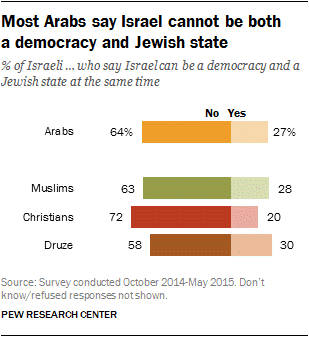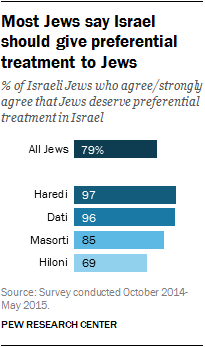A very interesting survey of opinion amongst Israeli Jews. There are flaws in the survey, in particular the question as to whether Israel’s Jews wish to live in a democratic society or one ruled by Jewish religious law.
Unsurprisingly the 40% of Israeli Jews who define themselves as secular said no to rule by the rabbis but that does not mean they are in favour of democracy. It simply means they favour civil Israeli law based on Zionist principles of racial discrimination.
That is brought out most clearly when 79% of Israeli Jews say they believe Jews should get preferential treatment compared to Arabs. And if there was any doubt about the matter 48% of Israeli Jews supported expelling Israel’s Arabs as opposed to 46% who were opposed.
Just imagine if, in any Western European country, a majority of the White population were in favour of expelling Muslims or Blacks.
What this survey proves beyond a shadow of a doubt is that the Israeli settler colonial state is a racist state unlike no other in the world.
It is also interesting that in Israel just 8% of Jews identify with the Left, however that is defined. The socialist Zionist dream is, in other words, destroyed. The pursuit of a society based on racial supremacy has resulted in society becoming an overtly right-wing society. Those who identify as ‘centrist’ are also on the right. In Israel centrist would be seen as right to far-right in most civilised countries.
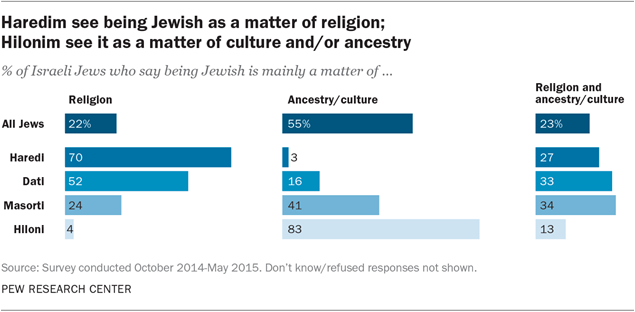 |
| 55% of Israeli Jews see being Jewish as a matter of ancestry i.e. race |
Equally interesting is that 22% of Israeli Jews see being Jewish as a matter of religion whereas 55% see it as a question of ‘ancestry’ and culture. Ancestry is a code word for race and biological inheritance. In other words 55% see being Jewish as a racial not a religious question.
Literally are the chickens coming home to roost.
For full report go here
Tony Greenstein
 |
| Israeli security forces frisk Arab Israelis near the Central Bus Station in Herzliya on January 5, 2016. (Tomer Neuberg/Flash90) |
Pew study finds 79% believe Jews should get preferential treatment over Arab citizens; number of those who believe settlements are helpful to Israel’s security growing; majority identify as centrist
Nearly half of Jewish Israelis agree that Arabs should be expelled or transferred from Israel, and a solid majority (79 percent) maintain that Jews in Israel should be given preferential treatment, according to a Pew Research Center in Israel survey published on Tuesday.
The poll, with 5,601 in-person interviews of Israeli adults, conducted between October 2014 and May 2015, found that Israeli Jews increasingly believe the West Bank settlements help, rather than hurt, Israel’s security – and most (61%) believe Israel was given by God to the Jewish people.
Three-quarters of Israeli Jews feel deeply connected to American Jews, but over half feel US policy is not supportive enough of Israel. Meanwhile, support for the two-state solution among Jewish Israelis hasn’t changed considerably in past years (though they are less optimistic than their American counterparts), but among Arab Israelis, it has plummeted.
And overall, the majority of Israelis identify as political centrists.
Expulsion of the Arabs
The survey makes no distinction between Palestinian Arabs of the West Bank and citizens of Israel in its question about whether Arabs should be expelled from Israel. And yet, 48% of Jewish Israelis said they were in favor, 46% were opposed, and 6% said they didn’t know.
Breaking it down into religious groups, the Modern Orthodox (the report uses the Hebrew term dati’im), were the most likely to support such a measure, at 71%. At the opposite end, secular Jews were most opposed, with 58% against (but over one-third supported it). Jews of Sephardic or Mizrahi ancestry — many of whom have ancestors who were expelled from their countries of origin — were more keen on the idea (56%) than their Ashkenazi counterparts (40%).
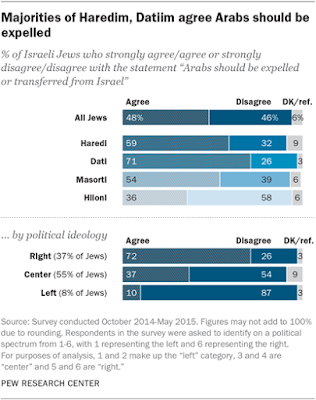 |
| Nearly half of Jewish Israelis agree with the statement: Arabs should be expelled or transferred from Israel (screen capture: Pew Research Center) |
Self-identified right-wing respondents were significantly more enthusiastic about the idea (72%), while those who identified as left-wing were solidly opposed (87% against). Among centrists, 37% backed it, 52% opposed it, and 9% replied that they did not know. There were no considerable differences found between settlers (54% support it) and those residing elsewhere (47% support it).
Most Jewish Israelis believe they should get preferential treatment in Israel (Pew Research Center)
Overall, Israeli Jews also overwhelmingly feel (79%) they deserve unspecified “preferential treatment” over non-Jewish minorities in Israel. Settlers were slightly more inclined to support preferential treatment (85%) than the rest of the population, but the view was popular among all Jewish groups in Israel regardless of religious level, particularly among the ultra-Orthodox (97%) and Modern Orthodox (96%), although 69% of secular Jews and 85% of traditional (Masorti) Jews also agreed.
At the same time, the majority of Israeli Jews (76%) said they view a Jewish state as being compatible with democracy – but the opposite was found among Arab citizens, with 64% maintaining Israel cannot be both a democracy and a Jewish state (63% of Muslims, 72% of Christians, and 58% of Druze feel this way).
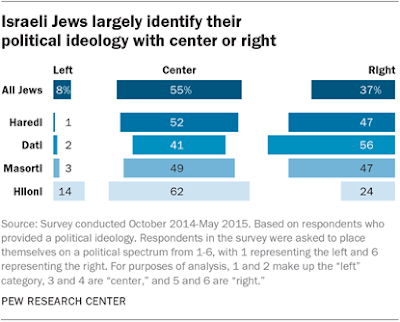 |
| Just 8% of Israeli Jews see themselves as identifying with the Left |
God, the land of Israel, and the settlements
Some six in ten Israeli Jews (61%) believe God gave the land of Israel to the Jews. The ultra-Orthodox and Modern Orthodox were nearly unanimous on this point (99 and 98 percent, respectively), while 85% of traditional Israeli Jews concurred. Among secular Israeli Jews, 31% agreed, 19% disagreed, and 50% said they don’t believe in God or don’t know.
Roughly one-fifth of Christians and Druze in Israel held this belief as well (19% and 17%), but “due to political sensitivities, Muslims in Israel were not asked this question.”
Marking a shift from past polls, some 42% of Jewish Israelis say the settlements help Israel’s security, 30% say they hurt Israel’s security, and 25% say it makes no difference. The differences were largely divided along partisan lines, with 81% of left-wing participants maintaining the settlements are damaging, 62% of right-wing respondents saying they are helpful, and centrists divided equally on whether it helps, hurts, or makes no difference (32% for each). Asked to place themselves on a political scale, some 55% of Israelis identified as centrist, 37% as right-wing, and 8% as left-wing.
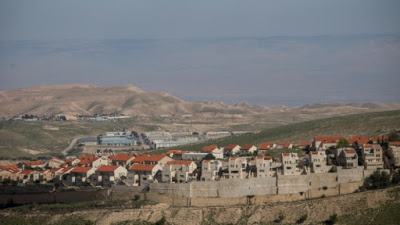 |
|
View of the Israeli settlement of Ma’ale Adumim, in the West Bank, February 25, 2016 (Yonatan Sindel/Flash90)
|
In a 2013 Pew survey, 35% said the settlements hurt Israel, 31% said they help, and 27% said it made no difference at all.
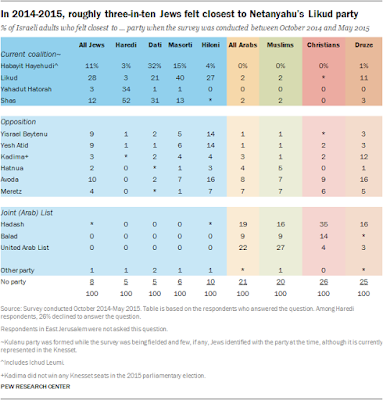 |
| Just 14% of Israelis identify with the racist Israeli Labour Party or the left-Zionist Meretz. There is no support for the mixed Jewish-Arab communist party Hadash |
Israel and the US
Three-quarters of Israeli Jews feel they share a common destiny with American Jews to a great extent or to some extent, and 59% maintain US Jewry have a “good influence” on Israel (only 6% said American Jews have a bad influence on Israel; the remaining 31% said their influence was neither good nor bad.)
But generally speaking, Jewish Israelis find US support lacking.
Some 52% say “US policy is not supportive enough of Israel,” while 34% say the amount of support is about right, and 11% say the US is too supportive. Some 62% of right-wingers, 49% of centrists, and 33% of left-wingers espouse the view that the US is not sufficiently supportive.
Meanwhile, a majority of Arab citizens – 77 percent — said the US was “too supportive” of Israel. Some 86% of Christians, 76% of Druze, and 75% of Muslims feel this way.
The end of the two-state solution?
Some 43% of Israeli Jews believe Israel and a Palestinian state can coexist peacefully side-by-side, while 45% do not, and 13% say it “depends.” Those who identified as left-wing were far more likely to believe in the two-state solution (86%), than those on the right (29%) and those in the center (46%). The figures were not dramatically different from those recorded in 2013 (when 46% said it was possible.)
Half of Arab Israelis are optimistic about the two-state solution, while 30% said it was not viable. This poll marked a deep decline in Arab Israeli faith in the two-state solution, from 74% in 2013, to 64% after peace talks broke down in 2014, to 50% after the 2014 Gaza war.
The Pew study also cited an annual Haifa University poll that asked Arab Israelis whether the two-state solution should be the guiding principle to end the conflict, but not whether it was possible. The data shows that since 2003, the numbers have fallen from 89% to 71% in 2015.
But while Israeli Jews and Arabs increasingly feel the two-state solution is not feasible, the poll points to a population that is holding out (at least until 2013): American Jews. Some 61% of US Jews believe the plan to be possible. The greatest optimists are American Jewish self-described liberals, 70% of whom maintain it can happen. The data on American Jews was drawn from a 2013 Pew study, and compared to the recent findings on Israelis.
